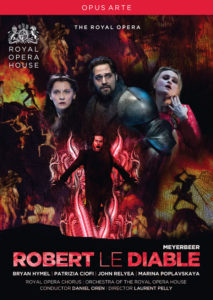
Opera Profile: Meyerbeer’s “Robert le Diable”
By Logan MartellGiacomo Meyerbeer’s “Robert le Diable” premiered on November 21, 1831, and is among the first of the grand operas performed at the Paris Opera.
Based on tales surrounding Robert the Magnificent, duke of Normandy, which claimed he was the son of the devil, the opera’s supernatural plot and dramatic impact made it an instant success. It had over 100 performances in Paris by April of 1934. Among the many who expressed their praise for “Robert le Diable” was Frederic Chopin, who believed that “Meyerbeer has made himself immortal.”
In the early part of the twentieth century, the opera began to fade from popularity due to its length and the expenses of production; however it has seen something of a resurgence in recent decades, allowing modern audiences to experience the macabre spectacle. One notable revival took place just a few seasons ago at the Royal Opera House Covent Garden led by conductor Antonio Pappano.
Short Plot Summary
The opera opens with Robert and a group of knights reveling as they ready for a tournament where the prize is the hand of Princess Isabelle. Raimbaut, Robert’s attendant, sings a tale about a princess of Normandy who had a child by a devil after marrying him. Robert is angered by this, revealing himself to be the son in question and sentencing Raimbaut to death. Robert eases his sentence in favor of asserting his right as lord to bed Raimbaut’s fiancée but changes his mind altogether when she is revealed to be Alice, who was raised with Robert as his foster-sister. Alice shares with Robert the news of their mother’s death, her final words a warning of an approaching evil. While she presents their mother’s will, Robert is too upset to read it, and instead sends Alice to deliver a letter to his beloved Isabelle. Before Alice departs, she urges Robert not to trust his strange friend Bertram, though he quickly dismisses this. Shortly thereafter the knights begin to gamble, and Robert, lured into the game by Bertram, ends up losing his money and his suit of armor.
After a joyful meeting with Isabelle, who grants Robert new armor for the tournament, Robert falls once again to temptation at the hands of Bertram. He lures Robert into the nearby forest under the pretense that the Prince of Granada, his chief rival for Isabelle’s hand in marriage, has challenged him to a duel. Because of this, Robert fails to arrive in time for the tournament, thus disqualifying him from entering and winning Isabelle’s hand. Later, in a cave, Bertram confides in spirits from hell while Alice overhears them; she learns that Bertram is the same devil who fathered Robert, and that he has until midnight to make Robert sign away his soul. After discovering Alice, Bertram forces her into swearing her silence on the matter. Robert, lamenting his loss of Isabelle, is easily manipulated by Bertram into his next foul deed: he is to take a magical branch from the tomb of Saint Rosalia within an abandoned cloister, thereby giving him the power needed to claim Isabelle as his own. When they arrive at the cloister, the spirits of the nuns rise from their graves in a ghastly ballet which honors the many vices. Robert resists them long enough to steal the branch and escape.
Using the power of the magic branch, Robert is able to freeze the guards outside Isabelle’s chamber. Before he can follow through on her abduction her pleading bring him back to his senses long enough for him to break the branch. While Isabelle expresses that she still loves him, he is taken away by her guards for using witchcraft. Not long after, Bertram arrives and frees Robert from his captors before revealing to him the truth of their relation to one another. He offers Robert his aid in preventing Isabelle’s marriage to the Prince of Granada on the condition that Robert sign away his soul to Bertram. While Robert initially decides to do so out of devotion to his newly-discovered father, Alice arrives in time to present him with his mother’s will once more. In it, his mother warns not to trust in the man whom she married and lost everything to. While Robert is torn between the conflicting wishes of his parents, the stroke of midnight sounds and so Bertram is dragged back to hell. Now free from the devil’s influence, Robert is free to reunite with Isabelle in the cathedral where she awaits him, dressed in bridal gown, to the joy of all present.
Watch and Listen
Not many staged productions of the opera exist out there, but there are some prominent recordings. Take a listen to a production from 2000 in Berlin led by Mark Minkowski as he conducts a cast that includes Jianyi Zhang, Kwangchui Youn, Marina Mescheriakova, Nelly Miricioiu, Stephan Rügamer, and Evgueny Alexeyev.
Categories
Opera Wiki

